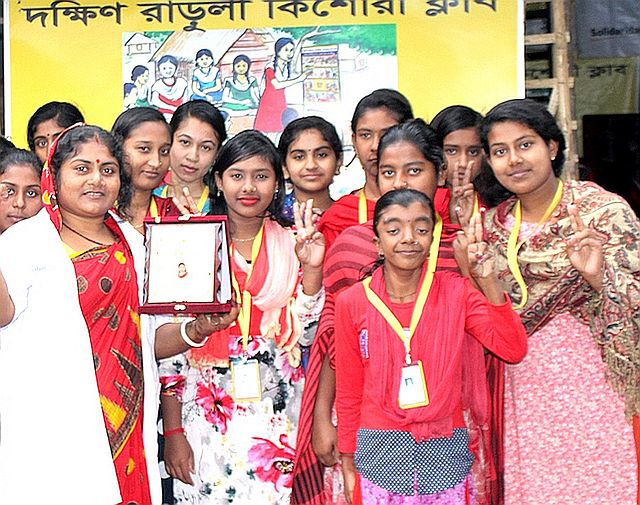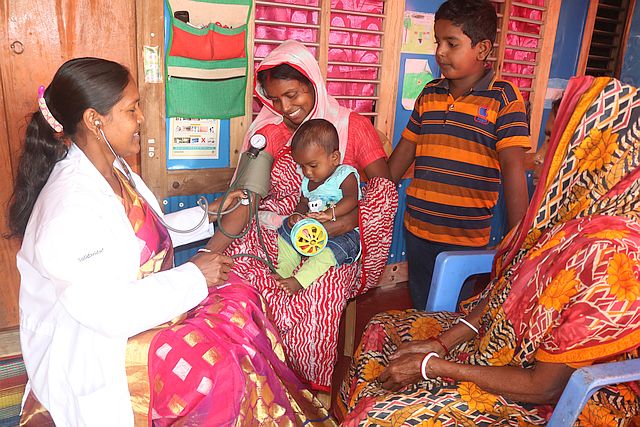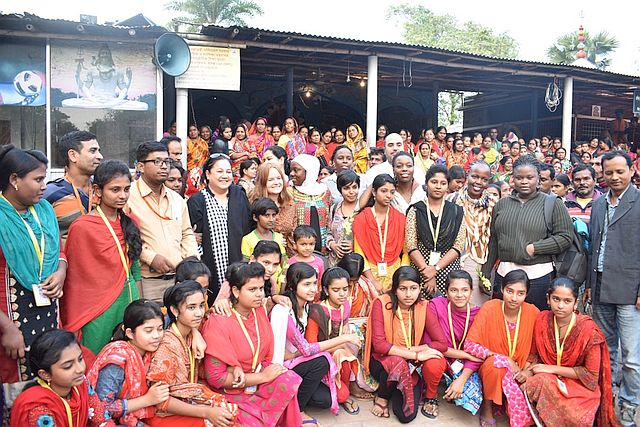Joyeeta Onneshone Bangladesh is an initiative by the Department of Women Affairs to promote women’s empowerment. Every year, the award is given in different categories to recognize the contribution of women to economic and social development, and to encourage other women to develop the confidence to overcome obstacles and become role models.

Liltu Rani Mandal celebrating her award with her local youth club
Community nutrition volunteers (CNVs) are rural entrepreneurs providing much-needed nutrition education and health services to rural communities. They provide basic healthcare, such as checking blood pressure and blood sugar levels, along with counselling and information services on health and nutrition, sexual and reproductive health, and diet.
Building an affinity with their communities
Kona and Liltu, who live in Khulna district, part of coastal southwestern Bangladesh, have both succeeded in building an affinity with their communities and are helping to transform local people’s health, hygiene and nutritional situation. They communicate with government medical facilities, physicians and health service providers, making it easier for the most disadvantaged people living in remote rural communities to access these.
“Thanks to my work I can support my children for their education and ensure my family has enough to eat,” says Kona (36). “The award will encourage me to grow my business and to contribute more to empowering women.”
The award will encourage me to grow my business" – Kona Poddar, community nutrition volunteer in Khulna, Bangladesh

Kona Poddar, providing basic healthcare service in the community
Liltu Rani Mondal (32) could only stay at school until the ninth grade before she was married off at 14 and had her first child. She now has a family of six, including her husband, in-laws and two children and was unsure how to explore her capacities. Liltu was trained as a CNV in 2014 and things started to turn around for her.
106,000 families reached
Both women were trained under the Sustainable Agriculture, Food Security and Linkages (SaFaL) project run by Solidaridad with the support of the Dutch Embassy since July 2017, working in the delta region of Bangladesh.
The overall objective of SaFaL is to enhance food and nutrition security of the 106,000 smallholder farmers and landless workers in the programme areas. The focus is on developing resilient livelihoods through adoption of market transformation approaches ensuring sustainable food production systems.
Empowered women
The project positions women as a powerful force for changing households’ and communities’ social, political and economic dynamics. It also supports the formation and growth of micro, small and medium-sized women enterprises by assisting access to financial services and knowledge.
SaFaL trains women as lead farmers, community nutrition volunteers and agri-entrepreneurs to change their communities’ norms and practices for adoption of good agricultural practices, dietary diversity and nutrition behaviour, and linkages with backward and forward markets.

SaFaL Gender Task Force members with the Khulna community
SaFaL’s gender-inclusive approach has supported 50,451 women in their role as farmers and entrepreneurs, helping them with access to the right markets. As part of the programme:
- 40% of producer groups are women (dairy 96%, horticulture 62%, aquaculture 29%)
- 45% of leadership positions in the producer groups’ executive committee are women
- 103 women undertook enterprise activities, with an average increase of € 44.5 in their monthly income
- 130 CNVs emerged as women entrepreneurs delivering health and nutrition services to rural communities
- 40 youth clubs have been set up, and 800 girls and boys educated on sexual reproductive health rights, working as peer educators on promoting these and ending gender-based violence
More choices
Their productive engagement in agriculture and entrepreneurship development helps empower women to delay marriages, choose the timing of their pregnancies, and access needed services and information.
Following a strategic planning meeting in Bangladesh at the end of 2020, the Gender Task Force is developing an even better understanding of gender dynamics and power relations to implement Solidaridad’s vision and strategy for gender equity and equality. It is tracking learning and achievements, communication and forging partnerships to support the implementation of our gender strategy.
It is also devising tools and guidelines for integration of gender across our strategy and programming to create equal opportunities between men and women across economic and political fronts and to empower women in areas where they need more support in areas including capacity and skills development, financial access and leadership training.
>Read more about Solidaridad's work in Asia
.
